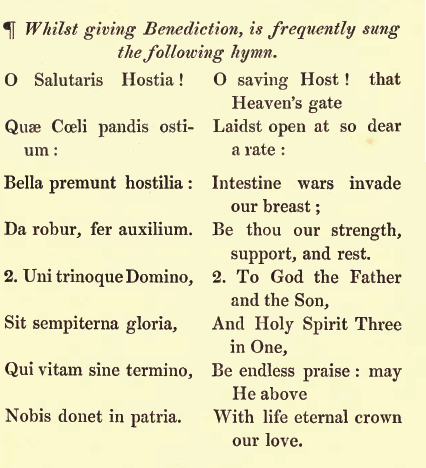Odd translation of O Salutaris : "Intestine wars invade our breast"
-
OXFORD ENGLISH DICTIONARY:
intestine, a.
(ɪnˈtɛstɪn)
[ad. L. intestīnus internal, f. intus within. Cf. F. intestin (14th. c. in Littré).]
Internal, belonging to the interior.
1. Internal with regard to a country or people; domestic, civil: usually said of war, feuds, or troubles, also of enemies.
†2. Internal with regard to human nature or the nature of things; inward, innate. Obs. rare. -
JMO, was that some arcane source of "comme l' prevoit" or dynamic equivilence?
If so, MIKEY LIKES IT! :-)Thanked by 1Gavin -
Sounds like an ICEL 2012 translation... (kidding!)Thanked by 1PurpleSquirrel
-
I think that's actually a quote from a Latin classic about their civil wars -- "bella intestina" -- so it would come to a classicist's mind back then very quickly. Using the word "intestines" instead of guts or viscera? Not so much.
Anyway, there's a lot of stuff, talking about Paul's "I do what I don't want to" and about the wheat and the tares both being in the Church, which brings up intestine wars. It's very interesting to see. -
Sounds like a fancy of saying "we've got heartburn...." :-D
-
Sounds like a desperate translator with a thesaurus too close at hand. "I need a three syllable word for 'internal.' And for some reason I can't use 'internal.'"Thanked by 1CHGiffen
-
And "internecine" suggests the existence of factions, which may not have been the point.
-
However, "intestine" as an adjective has the precise meaning of "internal" when concerning civil or governmental affairs. So, it's actually quite accurate.
-
Right. It's not that the word literally means the abdominal entrails and thus can be used by hack writers to refer metaphorically to other "internal" things (like Shakespeare, 1 Henry IV, I.I.12, "The intestine shock, and furious close of civil butchery"); rather, the word literally means "internal," and for that reason came to be used to refer to the innards of the body.
-
St Thomas' Episcopal Church in Houston was the graced locus of intestine singing both sublime, artful, and inspiring by the Choir of Men and Boys from Canterbury Cathedral tonight. How pauvre is our culture that we have to import such song every few years as a mere concert from afar where it has been an every-day part of their culture and worship life for fourteen hundred years. (I who have been a royalist since I was five years old, was delighted when they sang as their last selection, Handel's Zadok the Priest and Nathan the Prophet Anointed Solomon King. The church was the womb of this intestine singing, carried out with great intestinal fortitude and aplomb!Thanked by 1CHGiffen
-
Hilarious!
Welcome to the MusicaSacra Forum!
To participate in the discussions on Catholic church music, sign in or register as a forum member, The forum is a project of the Church Music Association of America.
Categories
- All Discussions21,295
- General Music Discussion8,304
- Job Openings217
- Management of Music Programs852
- Choral Matters534
- Church Documents and Rubrics528
- CMAA Notes304
- Events731
- For Newcomers: Read First26
- Sacred Polyphony550
- Hymnody876
- Gregorian Chant: General2,712
- ↳ Graduale Romanum and Liber Usualis370
- ↳ Graduale Simplex60
- ↳ Semiology64
- Vernacular Plainsong698
- Anglican Use and Anglican Chant68
- Organ, Other Instruments and Repertoire438
- New Composition/Works in Progress1,304
- Recordings234
- Music for Hispanic Ministry162
- Music Education: Children213
- Music Education: General222
- News Items245
- Positions Wanted3
- General Discussion: Catholicism740
- Amusements177
- General Discussion1,038
- Opinions119





